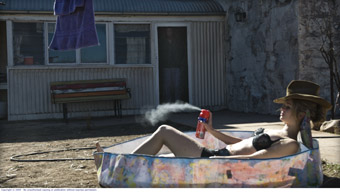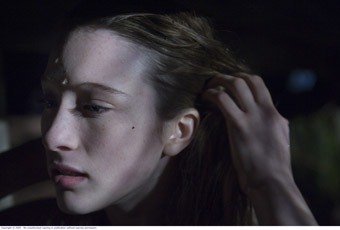taboo teen territory
kirsten krauth: rachel ward’s beautiful kate

Maeve Dermody, Beautiful Kate
Rachel Ward’s short feature Martha’s New Coat, created as part of the then AFC’s 50 Minutes From Home series—which also nurtured Matthew Saville (director, Noise) and Jessica Hobbs (Love My Way; Curtin)—proved she had a talent for unearthing the often unbearable darkness of being a teenage girl in troubled times.
With a feature-length film to play with, Ward continues the theme but broadens it to include a dying patriarch Bruce (Bryan Brown), his dissociated writer-son Ned (Ben Mendelsohn), returning after 20 years to the farm where his sister and brother died tragically, a devoted younger daughter Sally (Rachel Griffiths) and Ned’s girlfriend, the firecracker Toni (Maeve Dermody), who manages to spark off everything she touches.
Australian and New Zealand films have been preoccupied with girls on the cusp; think The Year My Voice Broke, Rain, Heavenly Creatures, Somersault, Caterpillar Wish, Puberty Blues. But Beautiful Kate breaks seriously fresh new ground by exploring taboo territory: the sexual attraction between teenage brothers and sisters. This time they’re not closeted up, like Flowers in the Attic, but occupy a dewy-hued flashback narrative, a garden of earthly delights that Ned tries to resist but, in the end, can’t. The central beauty Kate (Sophie Lowe) is, as you’d imagine, as fresh as a daisy. Her body is lithe and dances through the film, silhouetted against the harsh sunlight, upside down spinning on a Hills Hoist, naked in the dam at night. At times, her face emerging luminous from within the darkness, she becomes one of Bill Henson’s subjects, and his influence is everywhere in the gorgeous framing and use of light by first-time feature cinematographer Andrew Commis, who creates Kate's ghostly spirit via Ned’s point-of-view; she looks good enough to eat.

Sophie Lowe, Beautiful Kate
Beautiful Kate is also intensely erotic: the house, the heat, the sense of longing, that shuddering desire and sensory arousal of fourteen-going-on-fifteen, and the way that period captures you, stays in your memory, triggered by smells and sounds, the interplay of light and shadow. The flashbacks work this way too: Ned veers off into reminiscences about Kate almost against his will as he touches things around the rooms of a house that, judging by the decor, hasn’t changed much since his mum died. The clever narrative addition of Ned's much younger girlfriend Toni brings his lingering lust to life in the present, a tangible trace of Kate, as she flaunts her naked body around the verandah, or under the nose of Bruce’s National Party campaign poster (a reminder of his father’s failures). Toni is perhaps a suggestion of what Beautiful Kates may grow into in an uncompromising environment—tough-as-nails, manipulative, dating older men, only really happy performing to an audience—and possibly this is what Ned sees in her. This character could have been grating but Dermody brings a no-bullshit delivery and humour that brings some relief to the emotional drought the other characters are experiencing.
The film seems like a return home for the actors alongside the characters. As if Brown, Mendelsohn and Griffiths have been waiting for this dilapidated cottage in the Flinders Ranges to call them together as family. Brown and Mendelsohn gradually reveal a tenderness at their stubborn masculine cores that builds the tension—Brown reaching a vulnerable place beyond his usual surly laconic style—and it’s to Ward’s credit that her direction is enhanced at every turn by keeping things subdued. She joins a number of actor-turned-directors like Matthew Newton (Three Blind Mice) and Serhat Caradee (Cedar Boys) confident working with the nuance of performance. As she explains, “The back of a shoulder shuddering with emotion is more effective than in-your-face blubbering. Rebecca Smart tracing the line of a tear down Bryan’s face in The Shiralee (we never see his face) is an exquisite example…” (The Shiralee, miniseries, director George Ogilvie,1987).
Rachel Ward’s first feature is an outstanding debut. Beautiful Kate is a film that demands reflection and repeated viewing. It’s what comes together when you get a strong script, exacting casting, clever direction, a great soundtrack by Tex Perkins and a desire to confront audiences with something new and unsettling.
Beautiful Kate, based on the novel by Newton Thornburg, director, screenplay Rachel Ward, producers Bryan Brown, Leah Churchill-Brown, cinematography Andrew Commis, editor Veronika Jenet, composer Tex Perkins. Beautiful Kate featured in competition at Sydney Film Festival and is screening nationally.
RealTime issue #92 Aug-Sept 2009 pg.






